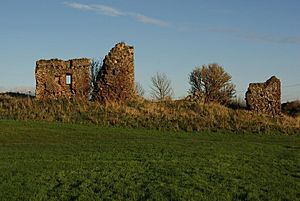Markle Castle facts for kids
Markle Castle, also known simply as Markle, is a castle that is now in ruins. It was built in the 1300s. You can find it about half a mile from the small village of Markle in East Lothian, Scotland. It is located near the main railway line on the east coast.
Contents
History of Markle Castle
Early Times and Builders
Long ago, in 832, a Scottish king named Óengus II is said to have rested his army near here. This was before a famous battle where the Cross of St Andrew (Scotland's flag) supposedly appeared in the sky.
The castle was built by a family called the Hepburns. Markle Castle was often owned by the same people who owned Hailes Castle, which is also nearby.
Attacks and Fires
Markle Castle was attacked and burned by the English army two times. The first time was in 1401. During this attack, an English knight named Henry Percy (Hotspur) was working with George de Dunbar, a powerful Scottish earl.
The castle was burned again in 1544. This happened during a time called the Rough Wooing. This was when England tried to force Scotland to agree to a marriage between their young rulers. The English army, led by Lord Hertford, set fire to Markle Castle on May 17, 1544. They had already set fires in other towns like Leith and Edinburgh. On that same day, other places like Haddington and Prestonpans were also burned.
Changing Owners
By 1588, official records showed that Markle Castle belonged to the Clan Stewart family. The last time it was mentioned in these records was in 1635.
Markle Castle was once owned by Francis Stewart, 5th Earl of Bothwell, who was a rebel against the king. In September 1594, King James VI of Scotland gave Markle Castle, along with other lands, to Walter Scott of Buccleuch.
What Remains of Markle Castle
Castle Structure Today
Today, only a few pieces of Markle Castle's walls are left. They stand on a rocky hill. The parts that remain show a tower house from the 1300s. This tower house forms a courtyard with a hall that was built later, in the 1500s.
Long ago, there was also a fortified ditch around the castle to protect it. There were also some buildings for monks nearby, but no signs of those remain today.
 | Roy Wilkins |
 | John Lewis |
 | Linda Carol Brown |


